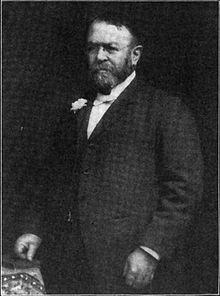Edwin J. Houston
Edwin James Houston (born July 9, 1847 in Alexandria (Virginia) , † March 1, 1914 ) was an American electrical engineer who developed a carbon arc lamp together with Elihu Thomson .
Life
After obtaining his Bachelor of Art from Central High School Philadelphia, he briefly worked at the universities of Berlin and Heidelberg. Around 1867 he was appointed from his high school to the chair of physical geography and natural sciences.
Among his students was Elihu Thomson, who was eight years his junior and who later became a chemist, but was also interested in electricity. He became his assistant and at the age of 18 his colleague as a chemistry professor. Together they experimented with electricity and invented a carbon arc lamp, which they patented and produced in 1881.
In 1882 they founded the American Electric Company in New Britain (Connecticut) , which was soon renamed the Thomson-Houston Electric Company . The company merged with the Edison General Electric Company to form General Electric in 1892 .
In 1882 he left the Thomson-Houston Company to teach. In 1894 he founded a consulting firm with Arthur Kennelly from Edison Laboratory. In 1872 he was elected a member of the American Philosophical Society .
Works
- Notes on Phenomena in Incandescent Lamps. 1884 at the IEEE
- The Elements of Physical Geography : For the Use of Schools, Academies, and Colleges. 1892
- Electricity in Every-Day Life. New York: PF Collier & Son, 1904
- The Wonder Book of Volcanoes and Earthquakes. Frederick A. Stokes Company (1907, 1908)
Web links
Individual evidence
- ^ Member History: Edwin J. Houston. American Philosophical Society, accessed October 4, 2018 .
| personal data | |
|---|---|
| SURNAME | Houston, Edwin J. |
| ALTERNATIVE NAMES | Houston, Edwin James (full name) |
| BRIEF DESCRIPTION | American electrical engineer |
| DATE OF BIRTH | July 9, 1847 |
| PLACE OF BIRTH | Alexandria, Virginia , USA |
| DATE OF DEATH | March 1, 1914 |
